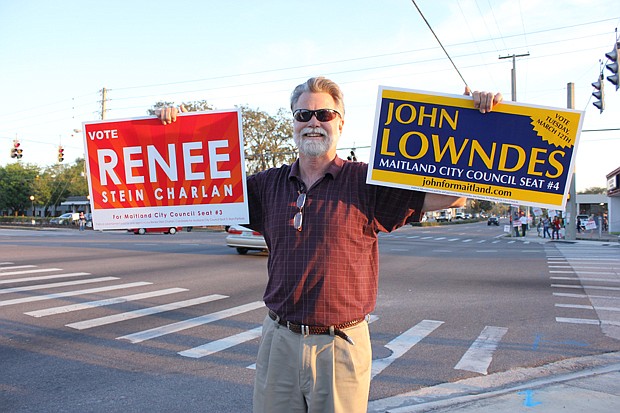- April 22, 2024
-
-
Loading

Loading

The mayor or fellow already-elected Council members publicly endorsing candidates for other seats on the dais shouldn’t land them in trouble in Maitland, say political science experts from UCF and Rollins College.
There’s a big gray area between what’s ethically and legally OK and what’s traditionally accepted as political culture, said UCF political science professor Aubrey Jewett.
Maitland Mayor Howard Schieferdecker had drawn criticism from fellow Council member Bev Reponen when she saw him actively campaigning for candidates in the March 12 Council election. Openly campaigning for candidates while in office or working for the city had become a rarity in the Maitland, and had led to a public resignation in Winter Park.
But aside from upsetting generally accepted social mores, it’s difficult to do much more damage by campaigning as a private citizen, Jewett said, even if you wield the personal credibility of being mayor.
So leading up the March election in Maitland, as long as Council members weren’t utilizing resources gained through citizen money and did so in an non-corrupt or threatening manner, Jewett said there’s nothing illegal or unethical about the mayor and Council members hitting the streets campaign signs in hand.
“It’s interesting to me that the tradition has been not to be involved,” Jewett said. “… In many areas of Florida and certain areas around the country, it’s just not really become an issue.”
The blurry line between campaigning as a private citizen when you’re a face-recognizable elected official, Rollins political science professor Rick Foglesong said, is made clear between the methods of right and wrong.
“It’s not appropriate for an elected office holder to use any of the resources of his or her elected office to campaign for himself or anther person … But it is permissible that someone would use their name or position to campaign for themselves or someone else,” Foglesong said.
According to rulings by the Florida Commission on Ethics, there’s another line drawn between an elected official using city time and resources – such as city stationery or business cards and on-the-job hours – and using privately sourced resource knockoffs and time off the clock. The first situation — using publicly funded resources to campaign — being unethical, and the second — using an official title through privately acquired means — is permissible.
So Maitland officials shelling out pizza at polling stations, shaking hands while going door-to-door on the street, and sending out endorsement emails from private accounts – as long as it’s being done without corrupt intentions, coercive actions or city-funded resources, or on city-time – Foglesong said, can be perfectly fine campaigning processes, even if they’re against tradition.
“That’s something that could come back and hurt someone politically if it’s contrary to the common practice, but that doesn’t make it unethical or unlawful either,” he said.